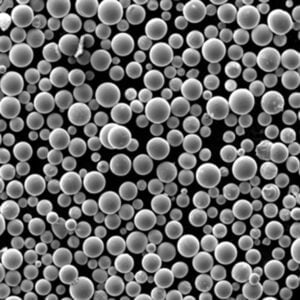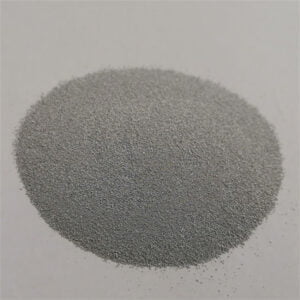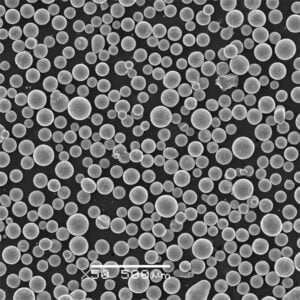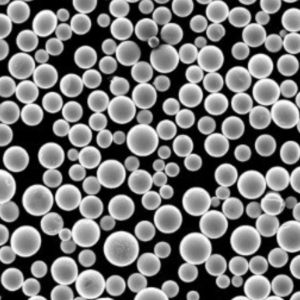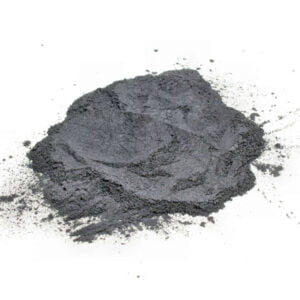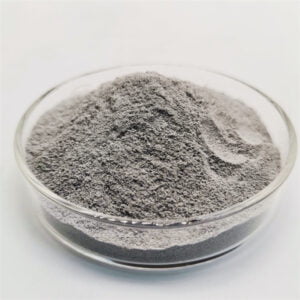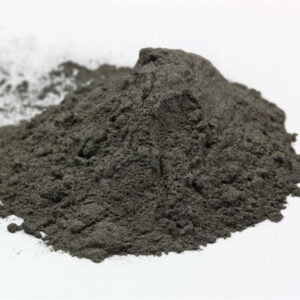Nickel Alloys Metal Powder
Table of Contents
Nickel alloys metal powders refer to powder metallurgy forms of various nickel alloy compositions. These powders can be used to manufacture nickel alloy parts and components through methods like metal injection molding, additive manufacturing, and powder pressing and sintering.
Overview of Nickel Alloys Metal Powder
Nickel alloy powders provide unique properties like high strength, corrosion resistance, and high temperature performance. Key details include:
Benefits
- High strength
- Corrosion and oxidation resistance
- High temperature stability
- Tailored electrical, magnetic, or thermal properties
- Lower costs than exotic alloy ingots
Manufacturing Methods
- Gas atomization
- Water atomization
- Carbonyl process
- Electrolysis
- Mechanical grinding
Common Alloy Systems
- Nickel-chromium
- Nickel-molybdenum
- Nickel-cobalt
- Nickel-iron-chromium
- Nickel-copper
- Nickel-aluminum
Typical Applications
- Aerospace components
- Industrial tooling
- Automotive parts
- Electrical contacts
- Corrosion resistant structures
- High temperature furnace parts
Specifications
Nickel alloy powders are available in various standard specifications:
- Size range: 1 – 150 microns
- Chemistry per application need
- Spherical, irregular, or blended morphology
- Gas or water atomized varieties
- Custom alloys and particle size possible
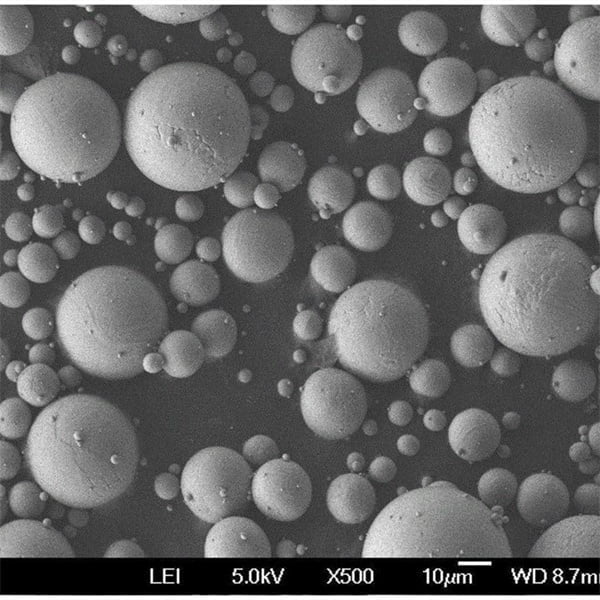
Types of Nickel Alloy Metal Powder
Many nickel alloys are available in powder form. Common alloy systems include:
| Alloy Type | Compositions | Key Properties |
|---|---|---|
| Nickel-Chromium | Ni-Cr, Ni-Cr-Fe-Mo | Oxidation resistance, strength at high temperatures |
| Nickel-Molybdenum | Ni-Mo | Corrosion resistance, maintain strength at high temperatures |
| Nickel-Cobalt | Ni-Co | High strength, corrosion resistance, tailorable magnetic permeability |
| Nickel-Iron-Chromium | Ni-Fe-Cr, Ni-Cr-Fe-Mo-Cu | Excellent oxidation and corrosion resistance at high temperatures |
| Nickel-Copper | Ni-Cu | High strength, corrosion resistance, tailorable thermal expansion |
| Nickel-Aluminum | Ni-Al | Lightweight, high temperature strength |
These alloy powder compositions can be customized to achieve application specific properties.
Characteristics and Properties of Nickel Alloys Metal Powder
Nickel alloy powders offer a versatile range of mechanical, physical, and chemical properties:
Mechanical Properties
- High strength
- Resistance to creep and fatigue
- Withstand repeated heating/cooling cycles
- Impact toughness
Physical Properties
- Coefficients of thermal expansion similar to steel
- Electrical resistivity tailored with chromium content
- Controlled magnetic permeability with iron and cobalt
Chemical Properties
- Resist corrosion in harsh environs like acids, chlorides etc
- Retain properties in oxidizing atmospheres up to 2000°F
- Welding characteristics similar to wrought nickel alloys
These properties make nickel alloys suitable for demanding applications across industries.
Applications and Uses of Nickel Alloy Metal Powder
Nickel alloy powders are used across industries where combination of properties is needed:
| Industry | Applications | Benefits Provided |
|---|---|---|
| Aerospace | Turbine blades, engine parts, airframe components | Strength at high temperatures, corrosion resistance |
| Oil and Gas | Valves, fittings, wellhead components | Strength, wear resistance, corrosion resistance at high temperatures and pressures |
| Automotive | Gears, shafts, exhaust components, turbocharger parts | Heat and wear resistance for powertrain parts |
| Industrial | Food processing equipment, pulp and paper machine parts, radiation shields | Corrosion resistance, high temperature strength, safety |
| Electronics | Connectors, lead frames, switches, shields | Conductivity, magnetism control, resistance welding |
| Chemical | Pumps, valves, piping | Corrosion resistance against various chemicals |
These applications utilize the balanced mechanical and chemical properties of nickel alloys.
Specifications of Nickel Alloy Metal Powder
Nickel alloy powders are produced in various standard specifications suitable for different manufacturing techniques:
| Spec | Options |
|---|---|
| Alloy Grade | IN, N, CN nickel grades plus proprietary compositions |
| Particle Size | 1-10 μm, 10-45 μm, 45-100 μm, 15-150 μm |
| Morphology | Spherical, irregular/angular |
| Production Method | Gas atomized, water atomized, carbonyl |
| Purity | Nickel + alloying elements, low oxygen + nitrogen, custom impurity limits |
| Packaging | Jars, bags, drums under inert atmosphere |
These specifications allow selection of optimal powder for given production method like metal injection molding, pressing and sintering, additive manufacturing etc.
Suppliers and Pricing of Nickel Alloy Metal Powder
Most major metal powder producers offer various nickel alloy powder compositions and size ranges suitable for industrial production. Some leading global suppliers are:
| Company | Brands | Production Methods | Typical Pricing |
|---|---|---|---|
| Sandvik | Osprey | Gas, water atomization | $$$ |
| Carpenter Technology | Various | Gas, water atomization | $$$ |
| ATI Powder Metals | Various | Gas, water atomization | $$$ |
| Praxair Surface Technologies | Various | Gas atomization | $$$ |
| Hoganas | Various | Gas, water atomization | $$-$$$ |
| CNPC Powder Group | Various | Gas, water atomization | $-$$ |
Pricing can range widely based on alloy chemistry, powder size, quality levels, production method etc. Typical range is $50-$150 per kg for common alloys and sizes.
Pros and Cons of Nickel Alloy Metal Powder
vs Wrought Materials
Nickel alloy powder offers some distinct advantages but also limitations compared to wrought forms:
Advantages
- Components with complex shapes made easily
- Homogeneous microstructure from rapid solidification
- Near shape construction lowers machining needs
- Lower costs than equivalent alloy mill shapes
Disadvantages
- Post-processing may be needed after part making
- Size and geometry constraints for some methods
- Powder production has higher energy needs
- Secondary operations add cost versus castings
- Lower maximum strength level than wrought alloys
The balance of properties and economics determines optimal material form for a given application.
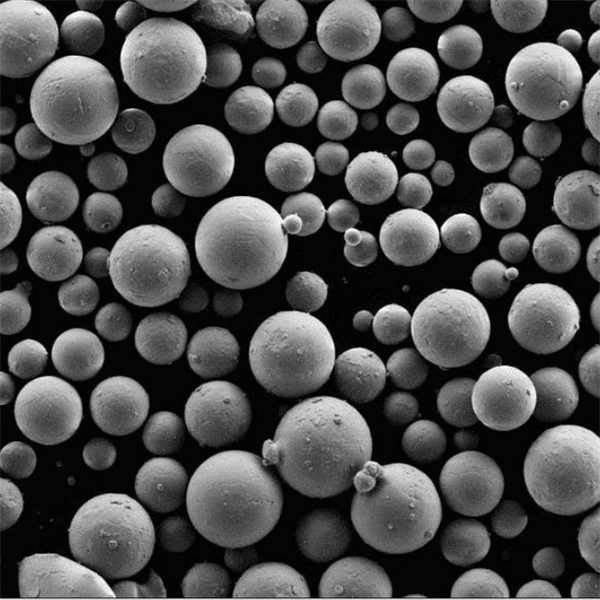
FAQs
Q: What are the main alloying elements used in nickel powders?
A: The most common alloy additions are chromium, molybdenum, iron, cobalt, copper, and aluminum to achieve desired properties.
Q: What powder production methods are used for nickel alloys?
A: Gas atomization and water atomization are the primary techniques. Some nickel alloys are also made via carbonyl powder production.
Q: What particle size range is typical for nickel alloy powder?
A: Most powders fall between 1 micron to 150 microns. Finer powders below 45 microns are used for sintering and metal injection molding. Coarser particles from 45-150 microns suit pressing and extrusion or additive manufacturing.
Q: How do costs of nickel alloy powder compare to wrought materials?
A: Nickel alloy powders can offer 30-50% cost savings over forged billets or bar. But secondary processing after powder consolidation may lower the cost benefit ratio.
Q: What standards apply to nickel alloy powders?
A: ASTM, ISO, and other national standards help define chemistry, impurity limits, particle size distribution, and sampling methods for quality control.
Conclusion
Nickel alloy metal powders provide a versatile material option combining high strength, corrosion resistance, thermal stability and other tailored properties. Key alloy systems include nickel-chromium, nickel-molybdenum and nickel-iron-chromium among others. These advanced powders enable manufacturing of critical components across aerospace, oil and gas, automotive and industrial sectors. With expanded use of powder metallurgy techniques, nickel alloys continue seeing rapid adoption via metal injection molding, additive techniques and press-and-sinter methods.
Share On
MET3DP Technology Co., LTD is a leading provider of additive manufacturing solutions headquartered in Qingdao, China. Our company specializes in 3D printing equipment and high-performance metal powders for industrial applications.
Inquiry to get best price and customized Solution for your business!
Related Articles
About Met3DP
Recent Update
Our Product
CONTACT US
Any questions? Send us message now! We’ll serve your request with a whole team after receiving your message.

Metal Powders for 3D Printing and Additive Manufacturing
COMPANY
PRODUCT
cONTACT INFO
- Qingdao City, Shandong, China
- [email protected]
- [email protected]
- +86 19116340731






